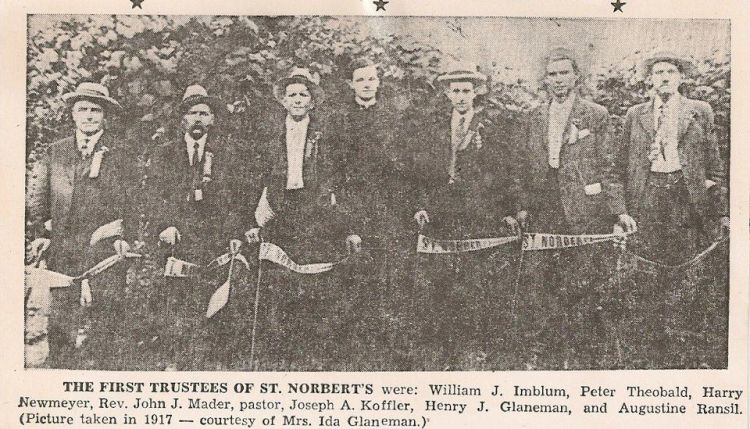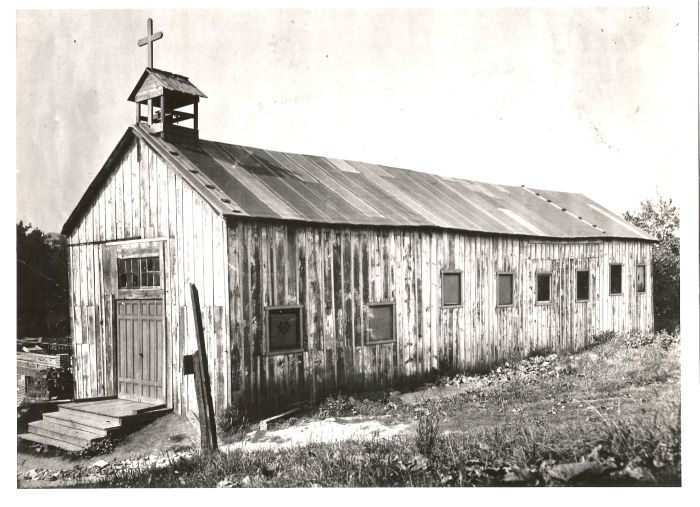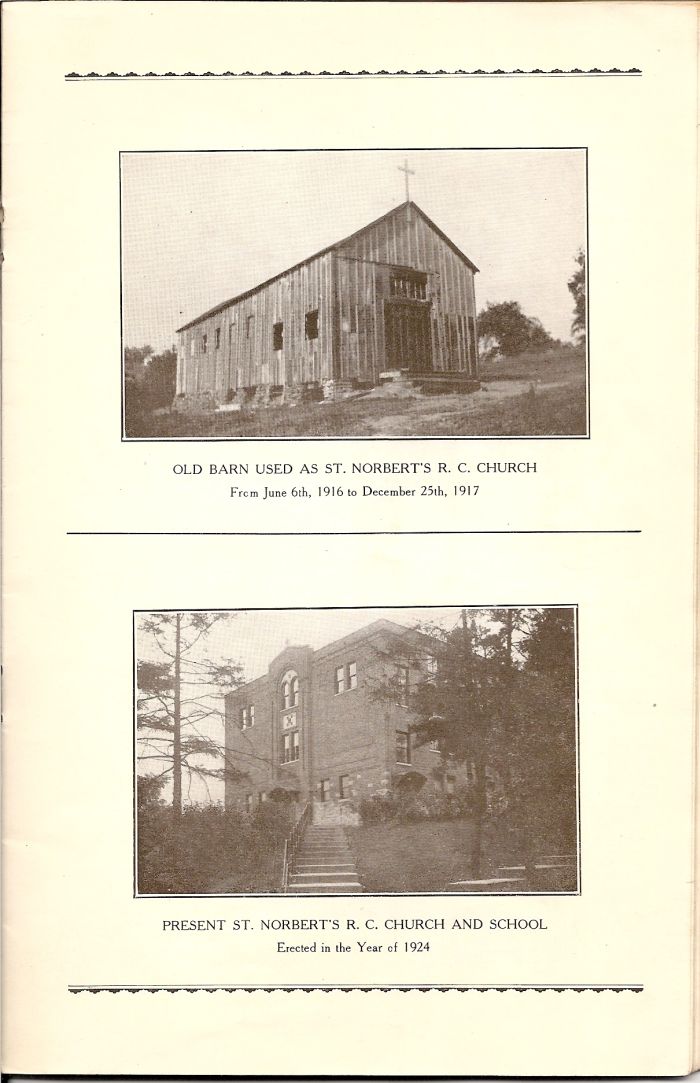Difference between revisions of "Saint Norbert Church"
| Line 2: | Line 2: | ||
[[[[Image:Overbrook dedication souvenir pg 18.jpg]] | [[[[Image:Overbrook dedication souvenir pg 18.jpg]] | ||
| + | |||
| + | [[File:First Trustees of St. Norbert's rev.jpg]] Photo taken 1917 courtesy of Ida Glaneman | ||
| + | |||
| + | William J. Imblum, Peter Theobald, Harry Newmeyer, Rev. John J. Mader, Pastor, Joseph A. Koffler, Henry J. Glaneman, and August Ransil | ||
Revision as of 17:13, 30 March 2013
 Photo taken 1917 courtesy of Ida Glaneman
Photo taken 1917 courtesy of Ida Glaneman
William J. Imblum, Peter Theobald, Harry Newmeyer, Rev. John J. Mader, Pastor, Joseph A. Koffler, Henry J. Glaneman, and August Ransil
History
On December 2, 1914, permission was granted by the Most Reverend Regis Canevin to establish a parish in Fairhaven.
Father Charles Hipp, pastor of St. Anne’s Church was appointed temporary pastor with Father Jacob Hungerman as assistant.
The first Mass in the new parish was said on the feast of the Circumcision, January 1, 1915, in the home of Harry Newmeyer located at the foot of Hillview Street, then known as School Hill (now known as Hillview Tavern). Holy Mass continued to be said there for a little over one year. The parish then comprised 150 families. Father John Mader, then assistant at St. Martin Church, West End, Pittsburgh, was appointed first resident pastor in March 1916. The patronal name chosen for the new parish was Saint Norbert.
During April 1916, the congregation bought the Horning farm (present property), on which was located a barn and frame house. The house was to serve as a parish house; the barn was conditioned to serve as a church, known as “The Cathedral.” Holy Mass was said there from June 6, 1916 until December 25, 1917.
During this period of time, the school was built, and the first floor of the school became the church. After the death of Father Mader on January 7, 1931, Father Leo Sehringer, then pastor of St. Barnabas Church, Rankin, PA was assigned to take over as Pastor July, 1931. With zeal, courage and ability, Father Sehringer completed the parish house, making substantial and needed additions. Father Sehringer’s ambition was to build a new church. The depression years, however, made the realization of his fond hopes impossible. Following a period of ill health, Father Sehringer died on April 26, 1946.
Father Leo Donnermeyer was appointed pastor during the latter part of June 1946. The present church was finally completed while Father Donnermeyer was pastor in June 1958. (pictures 1, 2, 3, 4)
Father James Kelly was appointed pastor in June, 1970 by Bishop Vincent Leonard. During his years as pastor, the parish and school continued to grow and enjoy many spiritual and social events. Unfortunately, during this same period of time the cost of maintaining the parish and school rose considerably and many people moved outside of the city limits.
Father Mauro Cautela was appointed pastor in 1989. Father was noted for his vibrant personality. During his time as pastor, the enrollment faced a severe decline and because of financial conditions, the school had to close.
In 1992, the Diocese of Pittsburgh began a process of parish reorganization. Bishop Donald Wuerl assigned Father Michael MacVeigh as pastor to Saint Norbert Parish. Father was noted for his ministry to the sick and elderly.
Upon Father MacVeigh's retirement in June of 2005, Bishop Donald Wuerl appointed Father Mark Eckman, pastor of St. Sylvester Church, as pastor of St. Norbert Parish.
In July of 2009, Bishop Zubik named Father Mark Thomas as Administrator of Saint Norbert Parish.
St. Norbert was born in the area of Cleves around the year 1080. A canon of the church of Zanten, he was converted from a worldly life and, embracing the religious state, was ordained to the priesthood in 1115.
Undertaking the apostolic life, he accepted the duty of preaching, particularly throughout France and Germany. Gathering together some companions, he laid the foundations of the Premonstratensian Order, for which he also founded monasteries.
Elected Archbishop of Madgeburg in 1126, he reformed the Christian life and spread the faith to nearby pagan nations. St. Norbert died June 6, 1134 at Magdeburg, Germany.

